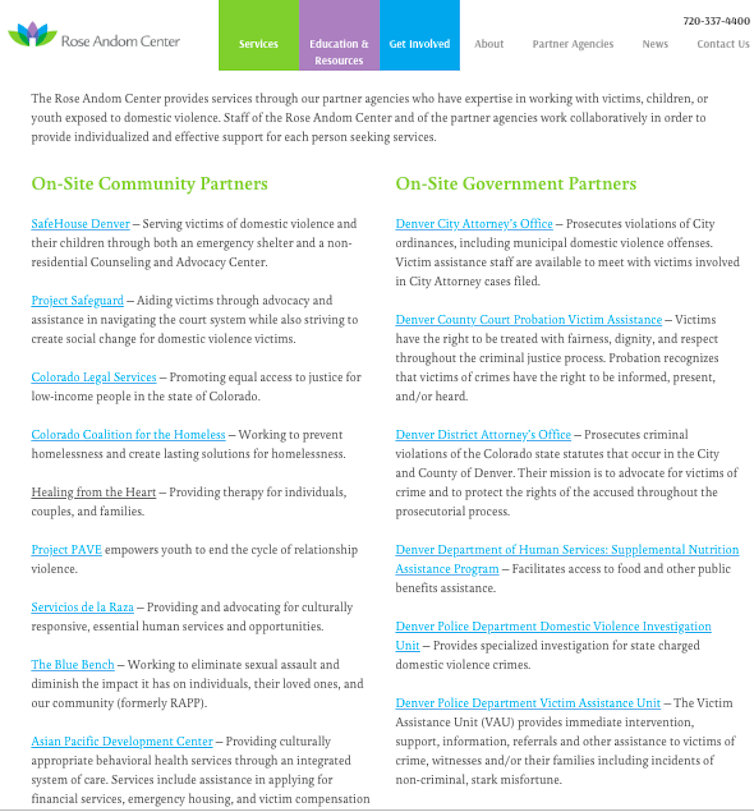Don’t Make Intimate Violence Victims Look for Help

Wanda Gomez, a survivor of domestic violence, poses in her home, in Miami, Fla. According to Gomez, she lost her job and home after being stabbed nearly to death by an ex-boyfriend. AP Photo

Connecting state and local government leaders
COMMENTARY | Research shows victims fare better when police and community organizations coordinate assistance.
Michelle Monson’s story, reported by Rachel Louise Snyder in “No Visible Bruises,” is a haunting tale of intimate violence and missed opportunities.
Michelle tried to escape her husband’s abuse. She tried to get help for herself and her children. Many of the people from whom she sought help had a piece of the puzzle. But no one saw the whole: that Michelle’s life was in imminent danger.
In the end, Michelle’s husband killed her and their two young children.
Not every story of intimate violence ends as Michelle’s did. But Michelle’s story has much in common with what I’ve learned from women over 20 years of conducting research on the consequences of intimate violence .
Over that time, public awareness of intimate violence has increased, in part as a result of the #MeToo movement.
Yet women and children remain incredibly vulnerable to harm after violence. They may face physical injuries and psychological distress as well as educational, employment, social, housing and legal problems.
And getting help can be overwhelming.
In the Aftermath
After intimate violence, victims may miss work and lose wages because of injuries or abusers stalking them at work. On college campuses, avoiding assailants can mean skipping classes and withdrawing from activities.
Just getting basic needs met, such as housing, is often difficult after violence. Some women flee their homes to escape abusers. Others face eviction threats from landlords who have wearied of the police showing up. Landlords are not supposed to evict tenants for being domestic violence victims. But victims may not know this.
Victims who report the incident to the police may be asked to have numerous conversations—with victim advocates, uniformed officers, detectives, prosecutors and even child-protection workers.
To get help with legal, health or social service needs, victims may have to visit multiple agencies at different locations. The very problems caused by the violence—housing instability and financial stress—can make getting to those agencies difficult.
If victims get through the door, they may not know the right questions to ask to get the services and support they need. For example, victims may not think to ask a counselor or police officer whether their landlord can evict them.
Victims may also discover that service providers do not necessarily communicate with one another, sometimes due to confidentiality limitations. Tracking lots of people and information can be made more difficult by post-traumatic problems victims may have with attention and memory.
Recognizing the challenges facing victims, communities nationwide are building victim-centered, coordinated responses to intimate violence. These responses prioritize meeting victim needs and sharing information (when confidentiality allows). Research points to the benefits of such coordinated approaches.
Coordinating Responses
To find out whether coordinating responses could help victims, I worked with a research team to test what happens when criminal justice and community-based agencies work together to respond to domestic violence.
Using a randomized-control design, we compared usual practice—where advocates gave victims lists of local resources that the victims could call themselves—to a new, coordinated response.
In the coordinated response, community-based and criminal justice agencies reviewed police reports together. They identified issues facing victims, such as housing problems or abusers showing up at their workplaces.
Based on what victims might need, a community-based agency from the team then contacted each victim. The agency offered services, such as counseling or help getting a court order to keep the violent partner away from the victim.
A year later, the coordinated response had an impact.
Leaving an abuser or holding them accountable in the criminal justice system can be difficult and even dangerous for victims. Yet, women who got the coordinated outreach (compared to other women who did not) were more likely to have left and been more involved in the prosecution of their abuser.
Though the psychological effects of intimate violence can last long after the violence, women who got the coordinated outreach had fewer negative mental health symptoms a year later compared to other women.

Breaking Down Silos
Coordination of services for victims of intimate partner violence makes sense because victims’ experiences with one agency can affect whether they contact other agencies, including the police.
My research team saw this when studying sexual assault, one of the most underreported crimes.
After sexual assault, women who got more practical help from community-based providers were more likely to report the assault to the police, even months later. For example, counselors and nurses helped women get medical attention, information and referrals for services to meet their needs. This practical support from people working outside the criminal justice system can help open doors into the system.
Though research points to the value of coordination, building coordinated responses is not easy.
Victim service providers trained in their own specialties have to learn to work across disciplines. For example, a counselor who knows about problems with attention, memory and traumatic distress has to learn the details of what happens in criminal investigations. A police officer who knows about investigations has to learn about the psychological impact of trauma. Agencies have to build new cultures of collaboration across their organizations’ boundaries.
We saw this in action when we studied concurrent investigations undertaken after campus sexual assault allegations. These investigations were conducted by both schools and law enforcement, who each have their own legal obligations, timelines for investigations and ways of talking about cases.
Often when these concurrent investigations happen, victims and investigators can end up feeling as if everyone is working at cross-purposes.
But these investigators set out to do something different.
Over 16 months, we observed how professionals from schools, community-based agencies and criminal justice offices went about trying to improve these concurrent investigations.
They spent much of their time teaching each other about their agency’s procedures and building relationships. For example, campuses explained the steps they took to meet the fast investigation time line expected by the federal government. The police explained the procedures they had to follow for interviews and collecting evidence.
They told us that their participation in the group helped them do their jobs better. Now they knew who to call and how to solve problems in the middle of complicated investigations.
Victim-centered, coordinated responses to intimate violence promise to improve outcomes for women and help providers do their jobs better. While these approaches do not necessarily change abusers’ behaviors, they can be an essential part of how communities help victims escape intimate violence, seek justice and rebuild.
![]()
Anne DePrince, Professor of Psychology, University of Denver
This article is republished from The Conversation under a Creative Commons license. Read the original article.

NEXT STORY: There Could Be Millions More Americans Living in Poverty Than Officially Reported




